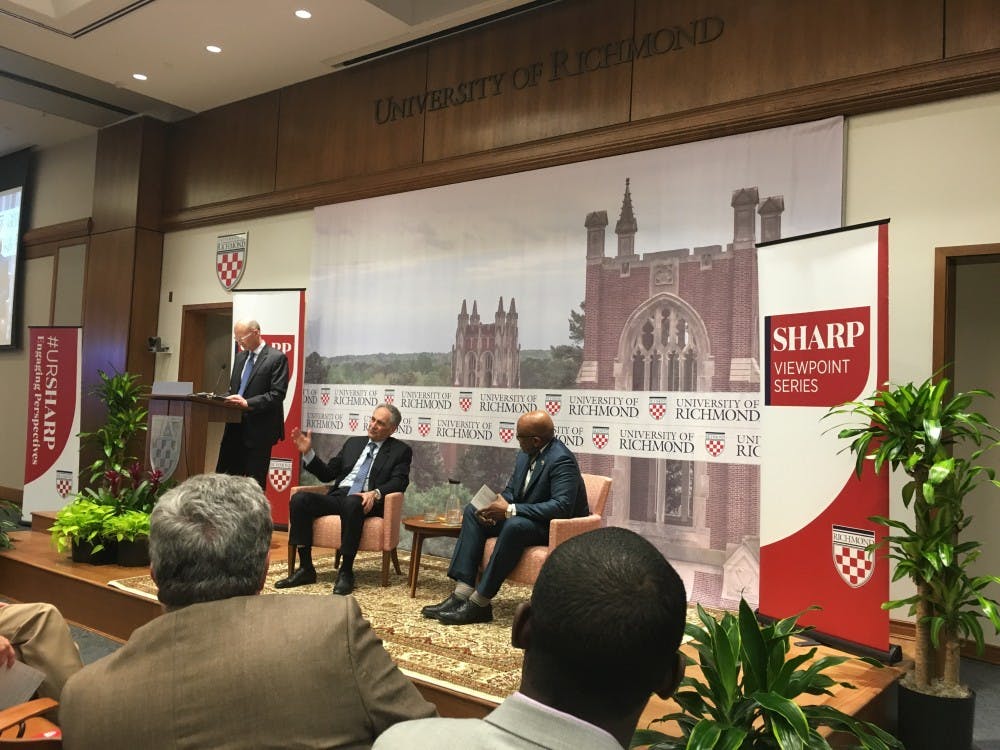“It’s not just about free speech, it’s about free listening,” Robert Zimmer, president of the University of Chicago, said as he addressed a crowd of University of Richmond students, faculty and community members Tuesday night at the Queally Center.
Zimmer's talk, which was part of the Sharp Viewpoint Speakers Series, was entitled "Freedom of Expression on Campus."
Zimmer and university president Ronald Crutcher engaged in conversation about the debate regarding freedom of expression on college campuses, including at UR.
“What we’re trying to do here is to model what it means to have rigorous conversations about very difficult subjects,” Crutcher said.
At the end of the program, Crutcher voiced his opinion about freedom of expression.
“Many people feel that they are not empowered enough -- because of the power differential -- to voice their perspective,” he said. “But as an educational institution, our mission is to ensure that we empower them -- both students as well as faculty and staff -- that they learn how to be empowered and learn how to find and use their voices.
“We are contributing to making our nation and our world a better place. I think it is important for the health of our democracy.”
Last week, a 10-person panel discussed freedom of expression at the university during "Got Voice?," an event created by Jane Berry, University Faculty Senate president, and the president’s office after the Faculty Senate withdrew a motion to create a task force to develop a freedom of expression policy at the university.
Most universities and colleges will want to implement a statement about freedom of expression after they think through what they are doing, Zimmer said in an interview with The Collegian prior to the event Tuesday.
“Students understand certain things they want, but I think there needs to be a broader discussion particularly amongst the faculty and the university leadership with input from the students about who are we as an institution and what does our education mean,” Zimmer said in the interview.
The University of Chicago developed what is commonly referred to as the Chicago Principles in the "Report of the Committee on Freedom of Expression" in Jan. 2015. The principles have since been adopted by universities and colleges across the nation.
Crutcher invited Zimmer to discuss freedom of expression because Zimmer was the first person who came to his mind when he decided to discuss the topic of freedom of expression, Crutcher said.
Enjoy what you're reading?
Signup for our newsletter
“I want to hear from really radically people,” Eric Grollman, assistant professor of sociology, said about the Sharp Viewpoint Speaker Series during the "Got Voice?" panel. “Stop getting these well-known conservative, white men. We know what they think. We’ve heard it.”
Sophomore Alec Greven has pushed the university to adopt a free speech policy. He enjoyed the event and thought it was a good way to continue the discussion about freedom of expression, he said.
During the question-and-answer portion of the event there were about 65 questions that had been submitted, Jeffrey Legro, executive vice president and provost of the university, said. The number of questions people wanted to ask showed the interest of the campus and community regarding freedom of expression, Greven said.
Zimmer admitted that living in an environment of free expression is not easy.
"It is not the natural state of humankind to want to live in that kind of environment," he said, "but it is a great environment for getting an unbelievably powerful, empowering and tough education that is going to set you up to be able to do things.”
Contact news writer Victoria Davis at victoria.davis@richmond.edu.
Support independent student media
You can make a tax-deductible donation by clicking the button below, which takes you to our secure PayPal account. The page is set up to receive contributions in whatever amount you designate. We look forward to using the money we raise to further our mission of providing honest and accurate information to students, faculty, staff, alumni and others in the general public.
Donate Now



